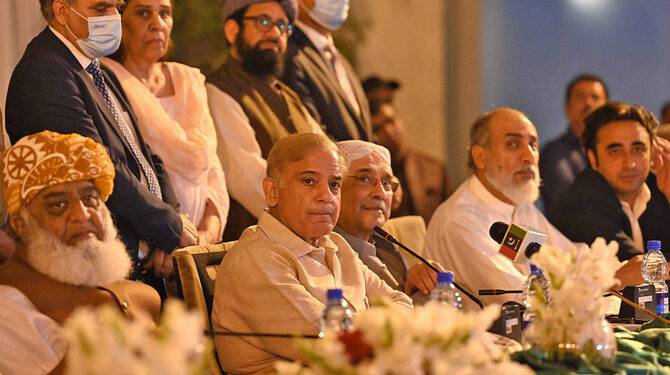
Though the coalition partners have remained together so far, cracks have begun to appear over several reasons, primarily the election 2023.
Though the current, main players of the alliance had never remained so close in the country's political history, the 'doctrine of necessity' may now dictate and dominate the future course of action.
The fold of almost a dozen political parties has been witnessing an awkward scenario as the Pakistan People's Party (PPP) clearly declares itself an independent party, moving away from the umbrella of the Pakistan Democratic Movement (PDM).
The political analysts and heavyweights have started viewing possible cracks within the alliance. The first and foremost reason would be the scheduling of elections in the country.
Differences over census
As the elections approach, the population census 2017 or recent digital census is being seen as suitable for conducting polls in the country.
But the allied partner from Sindh – primarily MQM-P – have time and again expressed their reservations to the prime minister in this regard.
Also, the differences over the seat adjustment, in Punjab in particular and other provincial constituencies in general, could further damage the alliance.
'Timely elections'
In the current scenario, holding the elections on time is a major challenge for Pakistan Muslim League-Nawaz (PML_N).
The rising unpopularity due to the price-hike is considered a main reason, with the ruling party reluctant to finalise a schedule for the polls.
In terms of remedial measures, the government has increased salaries of the government employees in spite of a economic crunch, but is still not confident to face the voters in the coming months, as per a discussion with the lawmakers by this scribe.
On the other hand, the PPP isn't, at all, in favour of an extraordinary delay into the polls.
Benefiting the foe
But this difference in the strategy on the election schedule could ultimately favour the Pakistan Tehreek-e-Insaf (PTI).
The recent statement by PPP co-chairman Asif Ali Zardari is evidence as he cautioned PDM to not start contemplating on delaying the polls. It comes on the heels of the PTI dissidents and defectors joining the party's ranks.
The JUI-F is in favour of imposing a ban on the PTI without any delay, but it has not been able to put substantial pressure on the major partners in the current scenario.
Friends, not so much
The political history of the country reveals that the alliances do not remain united for long as the parties are seen disassociating.
The example of MQM-P is one, as the party has a track record of partying ways with other organisations in the past.
Though the current, main players of the alliance had never remained so close in the country's political history, the 'doctrine of necessity' may now dictate and dominate the future course of action.
The fold of almost a dozen political parties has been witnessing an awkward scenario as the Pakistan People's Party (PPP) clearly declares itself an independent party, moving away from the umbrella of the Pakistan Democratic Movement (PDM).
The political analysts and heavyweights have started viewing possible cracks within the alliance. The first and foremost reason would be the scheduling of elections in the country.
Differences over census
As the elections approach, the population census 2017 or recent digital census is being seen as suitable for conducting polls in the country.
But the allied partner from Sindh – primarily MQM-P – have time and again expressed their reservations to the prime minister in this regard.
Also, the differences over the seat adjustment, in Punjab in particular and other provincial constituencies in general, could further damage the alliance.
'Timely elections'
In the current scenario, holding the elections on time is a major challenge for Pakistan Muslim League-Nawaz (PML_N).
The rising unpopularity due to the price-hike is considered a main reason, with the ruling party reluctant to finalise a schedule for the polls.
In terms of remedial measures, the government has increased salaries of the government employees in spite of a economic crunch, but is still not confident to face the voters in the coming months, as per a discussion with the lawmakers by this scribe.
On the other hand, the PPP isn't, at all, in favour of an extraordinary delay into the polls.
Benefiting the foe
But this difference in the strategy on the election schedule could ultimately favour the Pakistan Tehreek-e-Insaf (PTI).
The recent statement by PPP co-chairman Asif Ali Zardari is evidence as he cautioned PDM to not start contemplating on delaying the polls. It comes on the heels of the PTI dissidents and defectors joining the party's ranks.
The JUI-F is in favour of imposing a ban on the PTI without any delay, but it has not been able to put substantial pressure on the major partners in the current scenario.
Friends, not so much
The political history of the country reveals that the alliances do not remain united for long as the parties are seen disassociating.
The example of MQM-P is one, as the party has a track record of partying ways with other organisations in the past.

